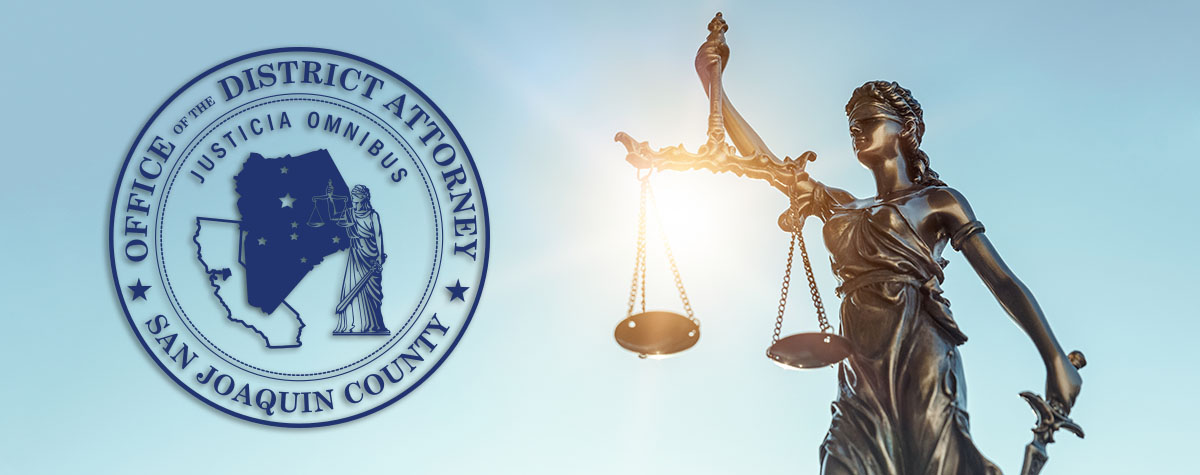Protecting our community for 175 Years
Special Operations Division
The District Attorney Special Operations Division plays a crucial role in upholding the integrity of the community they serve. They are responsible for enforcing the law and ensuring justice is served, thereby contributing to public safety and the well-being of the community.
This division oversees units that deal with criminal issues that affect the integrity and safety of the community in the areas of Public Integrity, Narcotics, Asset Forfeiture, and White Collar Crimes.
Case Information
For specific case information call
(209) 468-2400
Units
- Public Integrity Unit
- Asset Forfeiture Unit
- Metro Narcotics Unit
- White Collar Crimes Unit
Public Integrity Unit
Public corruption is the breach of public trust and/or abuse of position by an elected, appointed, or hired public official. Violations of public trust and/or abuse of position are reviewed by the Public Integrity Unit of the District Attorney’s Office.
The Public Integrity Unit is dedicated to upholding the highest standards of ethics, transparency, and accountability in government and public service. Our mission is to serve the community by ensuring the integrity and trustworthiness of public officials, institutions, and agencies. Our duties to the community are as follows:
I. Reviewing Allegations of Wrongdoing:
- We are committed to thoroughly and impartially reviewing allegations of misconduct, corruption, fraud, and other violations of ethical and legal standards within the public sector.
- Our inquiries are carried out with the highest degree of professionalism, integrity, and diligence to uncover the truth and protect the interests of the community.
II. Preventing and Deterring Corruption:
- We develop and implement preventive measures and policies to minimize the risk of corruption and unethical behavior within government agencies and institutions.
- Our educational initiatives raise awareness about the importance of ethical conduct and the consequences of corruption.
III. Engaging with the Community:
- We actively engage with community members to listen to their concerns, collect information, and provide a channel for reporting suspected wrongdoing.
- We promote civic participation and collaboration in the pursuit of public integrity.
IV. Safeguarding Whistleblowers:
- We protect and support whistleblowers who come forward with information about wrongdoing, ensuring their safety and providing a mechanism for confidential reporting.
- We review allegations made by whistleblowers and take appropriate action when violations are substantiated.
V. Ensuring Fair and Just Outcomes:
- We work to ensure that inquiries and actions taken as a result of our findings are fair, and just, and uphold the principles of due process and the rule of law.
Our commitment to the community is unwavering, and we recognize that public trust is paramount to effective governance. The Public Integrity Unit is dedicated to maintaining the highest ethical standards in the public sector and fostering a community where citizens can have confidence in the integrity of their government.
If you know about a breach of trust and/or an abuse of the position of an elected, appointed, or hired public official, please download a copy of our Public Integrity Inquiry Request form. For your appointment, please bring the unsigned form to the District Attorney Public Integrity Unit, located at 222 E. Weber Avenue, Stockton, CA 95202 where your request form will be checked in and submitted for review.
District Attorney Ron Freitas looks forward to working with the community to ensure that our public systems are fair and just for all!

Asset Forfeiture Unit
Asset forfeiture is a legal process that allows law enforcement agencies to seize assets from individuals suspected of involvement in criminal activity, especially in cases of drug trafficking, organized crime, and other serious offenses. The underlying principle is to disrupt criminal enterprises by taking away the proceeds and instruments of crime.
The District Attorney's Role in Asset Forfeiture
Legal Oversight: The DA's office reviews and approves forfeiture actions to ensure they are legally justified. They ensure that due process rights of the individuals involved are respected.
Prosecution: The DA's office represents the State of California in court proceedings related to asset forfeiture. They present evidence to justify the seizure and, if challenged, argue that the seizure was lawful.
Policy and Training: The DA's office provides training and guidance to law enforcement agencies about when and how to use asset forfeiture. They also help develop policies to ensure that asset forfeiture is used appropriately and effectively.
Management of Seized Assets: The law specifically directs the manner of distribution of forfeited assets to listed agencies and community programs. The DA’s office oversees this distribution.

Metro Narcotics Unit
The District Attorney Metro Narcotics Unit is responsible for investigating and prosecuting drug-related offenses within San Joaquin County. The unit plays a crucial role in the criminal justice system by enforcing drug laws and working towards reducing the prevalence of drug trafficking and abuse in the community. The Narcotics Unit functions include:
Prosecution: The primary role of the DA's narcotics unit is to prosecute cases involving drug offenses. This includes offenses related to the possession, sale, distribution, or manufacture of controlled substances.
Investigations: The narcotics unit often works closely with law enforcement agencies to investigate drug-related crimes. This can involve reviewing evidence from drug seizures, coordinating with undercover officers, or assisting in the execution of search warrants.
Legal Guidance: The unit provides legal guidance to law enforcement officers on matters related to drug enforcement. This could involve advising on the legality of certain investigative tactics or helping to ensure that evidence is collected in a way that is admissible in court.
Community Outreach: The narcotics unit may also engage in community outreach to educate the public about the dangers of drug abuse and the legal consequences of drug offenses.
Combatting narcotics abuse in poor urban areas requires a multi-faceted approach that addresses not only the supply of drugs but also the underlying social and economic issues that contribute to drug abuse. By addressing narcotics abuse in an approach that recognizes the complex factors at play, focusing on prevention, treatment, social support, community policing, and policy reform, it's possible to make significant strides in reducing narcotics abuse in San Joaquin County.

White Collar Crimes Unit
White-collar crime refers to non-violent criminal offenses typically committed by individuals or organizations in business or professional settings. Such crimes often involve deceit, breach of trust, or concealment, and are usually committed for financial gain. Examples include fraud (such as securities fraud, healthcare fraud, and tax fraud), embezzlement, insider trading, bribery, and money laundering. White-collar crimes, though non-violent, can have devastating effects on victims and undermine trust in financial and business institutions. As a result, they are taken very seriously by the legal system.
The District Attorney's Role in Combating White Collar Crimes
Investigation: In collaboration with law enforcement agencies, the DA's office investigates suspected white-collar crimes, often involving complex financial analyses to understand the extent and nature of the crime.
Prosecution: The DA's office prosecutes individuals or entities accused of white-collar crimes. They present evidence, argue cases in court, and work to secure convictions.
Victim Assistance: The DA's office, through the Victim-Witness Services Unit, has resources to assist victims of white-collar crime, helping them navigate the legal process and recover losses where possible.
Prevention: The DA's office also works on prevention initiatives, such as public education about common scams and frauds, and advising businesses on best practices to prevent white-collar crime. Check out our Consumer Alert pages for more information on current scams.
